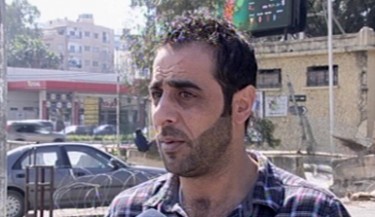A mobile phone video footage that shows an Ethiopian domestic worker being beaten and dragged by force into a car under the gaze of bystanders outside the Ethiopian consulate in Beirut, Lebanon has caused angry reactions amongst Ethiopian netizens
The video shows her laying on her back on the side of the road surrounded by her perpetrators who are speaking in Arabic. One of them is seen dragging her by the arms and hair. She was resisting while saying in Amharic “I will not go. I will not go.”
Instantly, Ethiopian netizens left hundreds of comments on YouTube. Many netizens shared the controversial video on their Facebook pages, the most frequented social media platform in Ethiopia, which in turn produced hundreds of comments. The silence of Lebanese onlookers on the side of the road and most importantly the inability of members of the Ethiopian consulate in Lebanon to keep the girl away from her perpetrators angered many Ethiopians.
Most netizens expressed anger at the perpetrators by stereotyping them as Arabs and Muslims.
One of the comments on YouTube from fisu2011 reads:
I want you to watch the video footage of “Barbarism in Lebanon” against defenseless Ethiopian woman. Someone has to be held accountable for this crime sooner or later. Shame on you barbaric Lebanese and Arabs. I hope once Syria is cleansed from Bashar Al Assad Lebanon might be expunged by the Israelites. Ethiopians who watched this video will never forget this brutality and will revenge soon or later.
The exchange of comments even became hostile towards Arabic culture and Muslims. One particular remark reads:
This is nothing compared to what many Arabs do to most emigrant workers…I have personally seen and witnessed some gruesome accounts of abuse and even death that happened to a number of Ethiopian woman, but as an EthiopianI feel for my sisters and as a human being I just can’t help but detest the Arabs and their barbaric culture…call it being racist or ignorant but this is the fact…..they are evil…
Yet, the conversation also included more moderate views from Ethiopians who insisted that Ethiopians must not stereotype people and must start to stand for themselves. For example, mamelo4us says:
I am not an Arab I am Ethiopian like you & I am proud to be a Muslim, if you had a brain you shouldn’t give a comment like that blaming all Arabs for what happen to our sister. Cruel, insane & criminals have no faith, race or color they are all over the world & we should fight them as a person not as race, faith or as a society. I know your comment will not reflect as all Ethiopians because we Ethiopians know the difference between one person & a society. They brought the criminal to justice

Ali Mahfouz – the man seen in the video abusing Ethiopian domestic worker. Photo courtesy of http://www.lbcgroup.tv/.
Mahlet Solomon, a prominent opinion leader, wrote on her Facebook:
I don’t want to share the video of the Ethiopian domestic worker being kidnapped in front of the Ethiopian embassy in Lebanon. I don’t want to share it because I am TIRED of the trivial question – why do Ethiopians suffer in every part of the world? And because there is nothing I can do about it or I have tried to do where as father(a white American) with the aspiration of giving a better world to his son wages a war on Uganda in the name of bring Joseph Kony to justice with the determination of stopping at nothing.Being confined by our limitation must stop, it must stop. Our expectation shouldn’t also be limited, they should not. And even if they are, we should exceed them yes we should exceed our limitation. We just have to start thinking, THINK!!!”
De Birahan blog contextualized the wide-ranging human right abuse in the country by giving a detailed perspective:
Maids in Ethiopia are mostly women who come to Addis Abeba from the rural to work in urban houses. They live with the people sheltered and fed, and paid a meagre monthly salary for their services. They often do the cooking, cleaning, washing, all houses chores; guard the house at times and also as nannies. Although there exists a symbiotic relationship between the employer and the maid; the intricacies of it shows that it is more of feudalistic and elitist. Some could argue that Ethiopian maids who export themselves to Arab countries face even the worst type of abuse there, so better that they be anyway here. No “Injustice anywhere, is injustice everywhere”, in most middle eastern countries and Ethiopia maids work long hours, seven days a week and month, no or sporadic vacations, no legal recourse in the case of disagreement with their employer. Maids most often maids eat leftovers or she cooks special food poor in quality and content from the rest of the household members for herself, sleeps in a separate building and room from the family (service bet). In most cases teenage maids that come from rural areas to help themselves and poor families are made to go to evening class (if ever allowed). They are forced to sex or raped by the men in the household (husband, son or relatives).
While many Ethiopian domestic workers flock to the Middle East, the Ethiopian government has not taken a leading role in protecting Ethiopian citizens enduring horrendous human right abuse in the region. Social media platforms continue to be a media outlet for Ethiopians to express their views and opinions about human rights abuse of domestic workers.
LBCI identified the man seen in the video, Ali Mahfouz, through his plate number.
Ethiopians organised a social media campaign for justice last year after a CNN journalist, Dan Rivers, revealed the horrifying abuse of Shweya Mullah who was brutally injured after the wife of Gaddafi’s son poured boiling water on her whole body for allegedly failing to keep a crying child quiet.